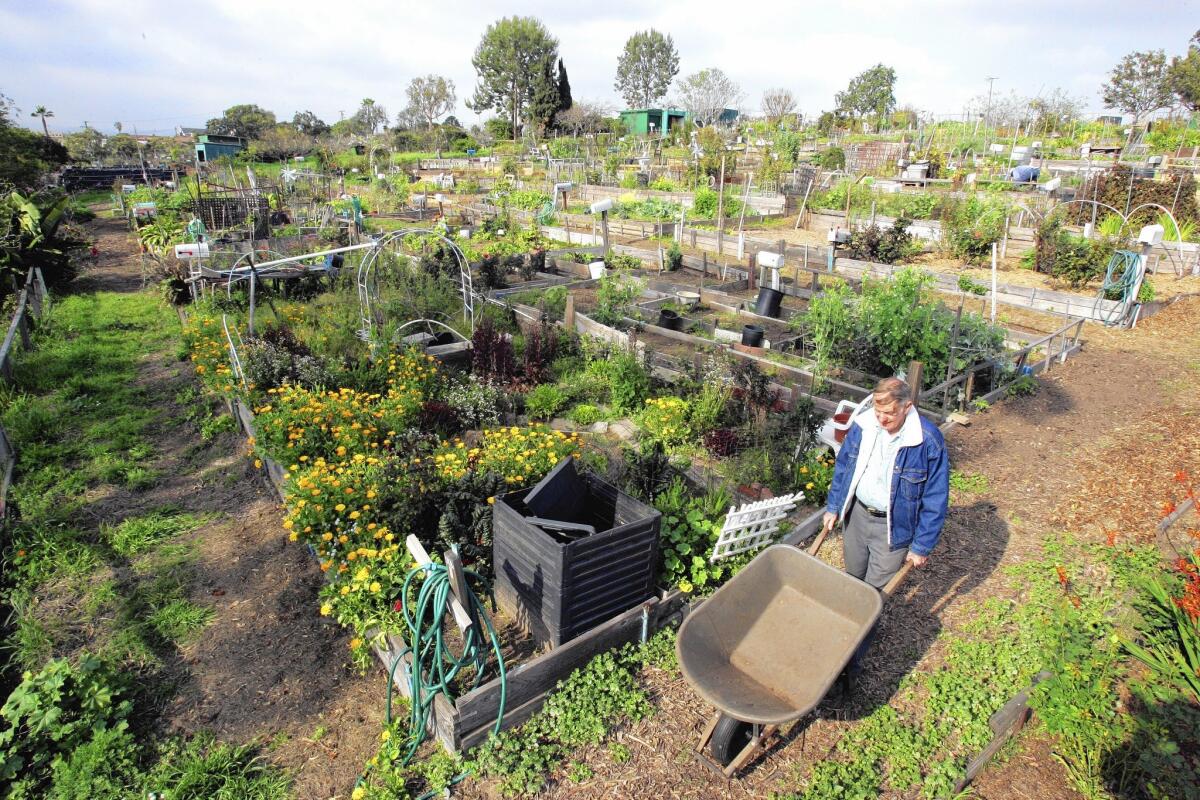A peak time to examine community garden etiquette in Los Angeles

- Share via
Community gardens around Los Angeles are heating up — and we don’t just mean the temperature is rising.
“This is our peak season. When it comes to the rules, people can get testy and argumentative,” said Al Renner, co-founder of the Los Angeles Community Garden Council, which boasts more than 32 gardens, all with waiting lists.
With community gardens growing in popularity and expanding rapidly, more personalities come into play, and that can make for conflict. Renner has heard about almost every breach of etiquette imaginable. Fruit and vegetable theft tops the list, in his opinion. “It happens in every garden, and I’ve seen people ready to take out a shovel or a machete if they can catch the thief,” he said.
Issues range in severity, and punishment can be as simple as a dirty look for a minor offense or the boot for something really serious. Offenses, real or perceived, can lead to discussions, email reminders or angry letters.
In some gardens, corn has been outlawed because it blocks the sunlight, creating issues with plot neighbors. More no-no’s: Traipsing through other members’ plots, engaging in overly competitive chatter and not keeping up with weeding. Other complaints are dogs running loose, toddlers frolicking and tomato cages and garden gloves gone missing.
Communication can nip problems in the bud. Ocean View Farms, which has close to 400 plots, was founded in 1977 on acreage in West Los Angeles. While the garden has a Facebook page and a website where members can contact each other, each plot also has a mailbox.
“It’s a good old-fashioned way of communicating,” said Jean Hasselquist, who rides her bicycle to the garden regularly. On a recent afternoon, she had two handwritten notes to deliver — one regarding devil grass that was out of control and creeping into her plot and another about watering a friend’s garden.
“With this many plots and people gardening so close to one another, there are bound to be issues,” Hasselquist said. “Being able to drop a neighbor a note this easily keeps irritation at bay.”
Because people come and go at different times and often don’t know each other, there can sometimes be a lack of accountability. Lisa Kirk, a member of the now-shuttered Venice Community Garden, said it was shocking how comfortable people often felt using her tools. One day she said she found her shovel had been taken by another garden member and fashioned with other tools into a wind chime being used to scare away birds. “It was the last straw,” she said. “We ended up resolving it via text but I couldn’t believe it happened.”
Alex Alferov, a co-founder of Fountain Community Gardens, thinks that many urban gardeners just want to commune with their gardens, not each other.
“They don’t want to talk with each other or socialize, which some people consider rude,” Alferov said. “A small percentage of gardeners typically come to the organized events, but when they do, they are always pleasantly surprised. It goes a long way in strengthening bonds.”
Julie Beals, executive director of LACGC, believes community gardens are places for people from different backgrounds to come together and overcome their differences through the love of the earth.
“However, this takes a lot of time, work and patience,” she said.
Follow us on Twitter: @latimeshome






